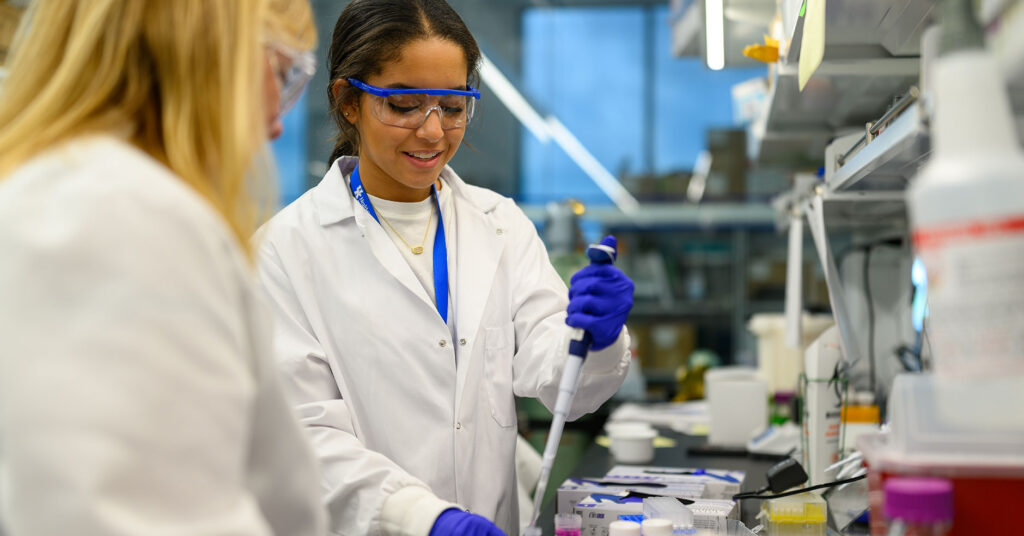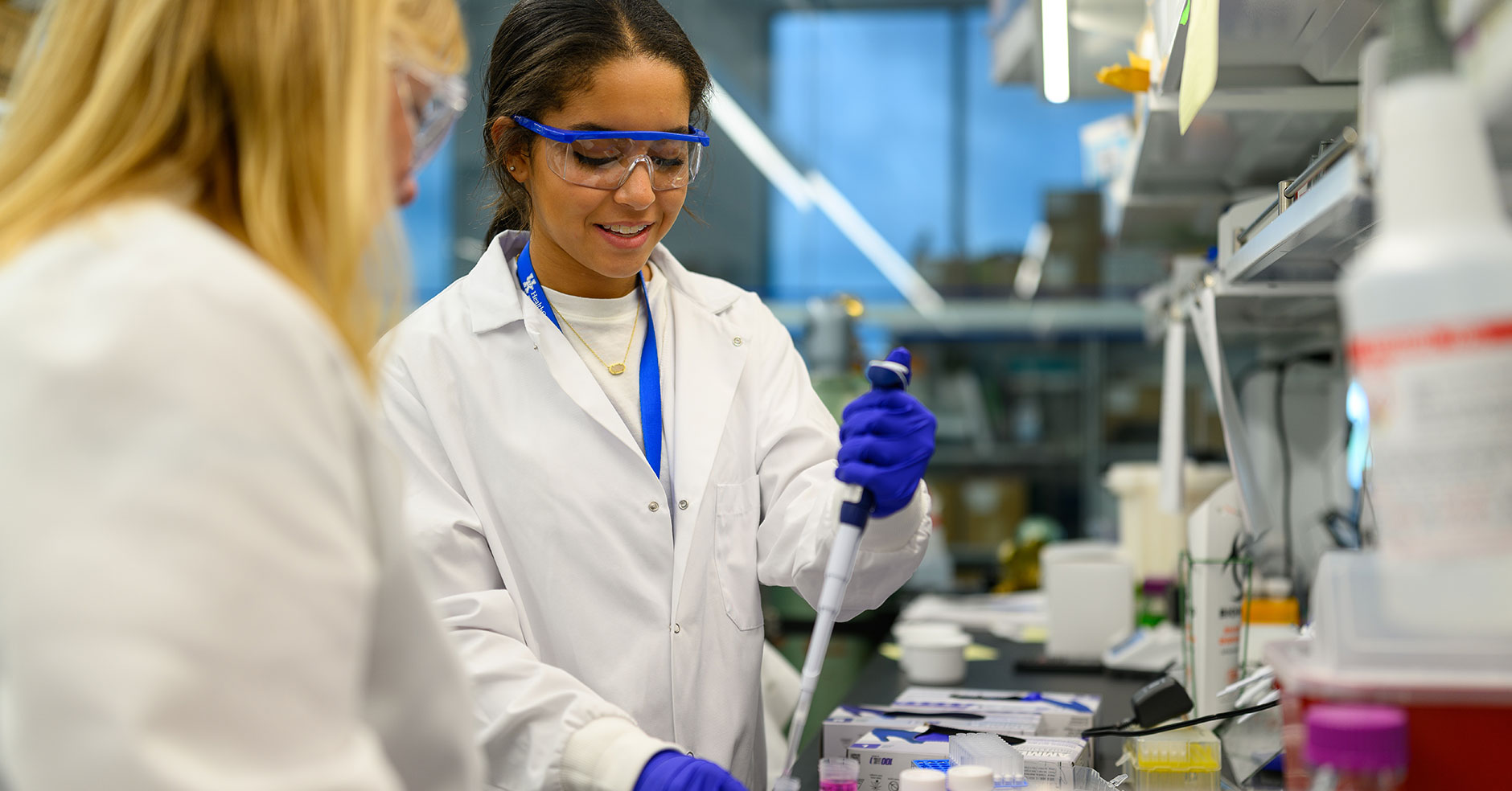Increased patient volumes, clinical trials, cancer vaccines, and federal funding
“The shift from one-size-fits-all treatment to precision medicine has been transformative.” — Mark Evers, MD, Director Markey Cancer Center, UK HealthCare
LEXINGTON (Editor’s Note) We asked B. Mark Evers, MD, to update us on the Markey Cancer Center 12 years after achieving NCI designation.
What is the mission of the Markey Cancer Center (MCC)?
MARK EVERS, MD: The mission of the UK Markey Cancer Center is to reduce cancer burden with a focus on Kentucky and its most vulnerable populations through research, prevention, treatment, education, and community engagement.
The MCC was designated a National Cancer Institute Center in 2013. Every five years there is a review process. In 2023, the MCC achieved the title of NCI Comprehensive Cancer Center. What does the added “Comprehensive Cancer Center” mean to MCC’s work?
Achieving Comprehensive status in 2023 was ten years in the making — the fastest pace possible. Markey is now one of only 57 Comprehensive Cancer Centers in the U.S. and the first and only in Kentucky.
This designation means we meet the highest standards across three pillars: laboratory research, clinical research and treatment, and population science and prevention. What that means for Kentuckians is that no patient needs to leave the state for outstanding clinical care and cutting-edge research.
The designation also secured a five-year, $13.5 million NCI Cancer Center Support Grant renewal to support Markey’s research programs and shared resources.
Describe the staff of the MCC, recent growth in patient volumes, and an overview of Markey’s patient population.
As a matrix cancer center, we have 250 faculty researchers spanning 49 departments across 12 colleges at UK. Our research enterprise includes more than 370 research projects representing $58.6 million in research funding, plus $4 million in education and training funding.
We’ve experienced tremendous growth in patient volumes over the past several years. In 2023, we saw 5,060 new cancer cases, a number that has nearly doubled in the past decade.
We expect this growth to continue, anticipating more than a 50% increase in visits over the next decade. Our new 550,000-squarefoot Cancer and Advanced Ambulatory Building, opening in 2028, will help accommodate this demand along with plans to add more than 300 new employees and nearly 50 new physicians.
Ninety-seven percent of Markey patients are from Kentucky, with half from Eastern Kentucky. Our most common presentations reflect Kentucky’s cancer burden: lung cancer, breast cancer, gynecologic cancers, and hematologic malignancies.
What is the most exciting development you’ve seen in cancer treatment in your 30+ years as a surgical oncologist?
The past five to ten years is the most exciting time I’ve ever seen in cancer treatment. When I started 30 years ago, treatment options were very limited. Today, we have remarkable options including immunotherapy that uses a patient’s own immune system to fight cancer, as well as personalized medicine that is based on each tumor’s genetic fingerprint.
The shift from one-size-fits-all treatment to precision medicine has been transformative. We now recognize that everyone’s cancer is different, just like we are all different as individuals. Instead of giving the same treatment to all patients, we can tailor therapy based on specific molecular mutations in each patient’s tumor. Today, we’re talking about cures for certain cancers — something I never thought I’d see in my lifetime.
Which of Markey’s 90 clinical trials has you most excited and why?
We have a clinical trial testing a personalized vaccine designed to prevent pancreatic cancer recurrence after surgery. I’m particularly excited about this trial because, as a GI surgical oncologist, I’ve dealt extensively with pancreatic cancer throughout my career, and unfortunately patients often present when it’s too late and the disease has already metastasized. This trial tests a personalized vaccine designed to prevent recurrence after surgery, made specifically for each patient’s tumor. Given how challenging pancreatic cancer has been to treat, it represents a real breakthrough in how we might approach this devastating disease.
What cancer breakthrough do you predict we’ll see in the next five years?
Building on trials like our pancreatic cancer vaccine, I believe personalized cancer vaccines will be one of the next major breakthroughs. We’re seeing promising developments for melanoma and kidney cancer as well, and I expect these targeted approaches will significantly extend survival for patients with our most challenging cancers.
Additionally, I expect continued advances in cellular therapies like CAR T-cell therapy expanding beyond blood cancers to treat solid tumors, and radiopharmaceutical therapies that can deliver targeted radiation directly to cancer cells. The combination of AI with precision medicine will also accelerate our ability to match patients with the most effective treatments.
How has Kentucky’s cancer landscape changed since you started your role as director?
What makes treating cancer patients in Kentucky unique? The transformation has been remarkable. When I arrived in 2009, Kentucky unfortunately ranked number one in both cancer incidence and mortality. While we still lead in incidence, our mortality rates have improved to number two nationally — that’s progress, though we still have significant work to do.
Our lung cancer screening program exemplifies this progress. Despite Kentucky’s 200-year history with tobacco, we’re now second in the nation for lung cancer screening, behind only Massachusetts. Late-stage lung cancer diagnoses are declining at double the national rate.
What makes Kentucky unique is our focus on health disparities, particularly in Eastern Kentucky, where socioeconomic factors, high smoking rates, and geographic isolation create complex challenges. Our 19-hospital affiliate network ensures rural Kentuckians can access cutting-edge care close to home, something that sets us apart from other cancer centers.
Has funding from the NIH to MCC been cut? How will this affect MCC, its staff and the work of MCC?
Markey currently holds more than $35.7 million in NIH funding supporting cancer research, clinical trials, and cancer prevention. While there have been various proposals and policy discussions around federal research funding, there is tremendous bipartisan support in Congress for cancer research.
This federal investment is essential to our mission of reducing Kentucky’s cancer burden. We continue to work closely with our congressional delegation and remain optimistic about sustained support for the critical cancer research we’re conducting at Markey.
What’s the biggest challenge facing cancer care today?
The biggest challenge is workforce, specifically ensuring we have adequate staffing to meet growing patient demand. Our patient numbers have doubled over the last ten years, and cancer centers across the country are all competing for the same talented oncologists and specialized staff.
It’s a nationwide challenge because there’s a limited pool of trained cancer specialists, and we’re seeing increased demand everywhere. Sometimes providers choose private practice or industry positions, which creates ongoing recruitment needs.





